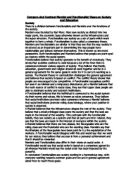Compare and contrast the Functionalist and Marxist views of society.
Sociology has been classified as the last in a long line of emerging scientific disciplines which people have developed and explored in order to make sense of their world. Early theories such as the positivist approach of Comte, the functionalist views of Emile Durkheim and the conflict perspectives of Karl Marx have offered a view of why human beings behave as they do and how they fit together in society.
Each theory has to some extent been shaped or influenced by the approach of others and many sociological explanations have comparisons or contrast that can be made. Browne once said “sociological perspectives centre on how much freedom or control the individual had to influence society” He goes on to comment on the two main approaches “structuralism is concerned with the overall structure of society and the way social institutions act as a constraint, or limit and control individual behaviour”.
Structuralism offers a view of the individual being controlled by the society they live in, Marx and Durkheim are similar in that they can both be described as structuralists, however their individual ideas are somewhat different.

This is a preview of the whole essay
Teacher Reviews
Here's what a teacher thought of this essay
Overall this is an impressive essay that demonstrates excellent knowledge of the two viewpoints and also a comprehensive use of language and turn of phrase. At times the key terms or quotes would benefit from further explanation but on the whole this is a thorough piece of writing and good example of sociological knowledge. Mark: *****
Peer Reviews
Here's what a star student thought of this essay
Quality of writing
The quality of writing is good. Spelling is accurate and the use of some punctuation is effective in demonstrating that the writer is aware of what vital sociologists have stated: “Giddens wrote ‘societies can no longer be understood through the application of general theories’â€Â. But capital letters are wrongly inserted in the middle of sentences, “Comparisons and Contrast will naturally occurâ€Â, and also here this would actually make more sense if the writer had instead said, “Similarities and differences will naturally occurâ€Â. Full stops are also occasionally missing from the end of sentences, for example the last line – “A subject like sociology has to be studied through a whole range of perspectives and should not be restricted by the margins of the structuralist approachâ€Â. However overall there are few grammatical mistakes, which can be overlooked as the essay is otherwise of great quality.
Level of analysis
The writer frequently uses sociological terminology, “bourgeoisie†and “primary socialisation†in context. The fact that these words are indeed used in context, rather than just simply defining them somewhere in the essay, shows that the candidate actually understands these concepts. A mistake that lots of GCSE candidates make is thinking that they will gain full marks by just memorising a textbook definition, and then regurgitating it. However in most cases this will be glaringly obvious as it will not fit in with their style of writing used throughout the rest of the essay. This candidate successfully avoids that. The question set is fairly generic, which means the candidate should cover a range of social institutions, instead of focusing, in detail, on one in particular. The writer explains Functionalist and Marxist views regarding the family, education and the economy, so it has definitely achieved that. Sociological quotes, such as Marx’s “opium of the people†are used which demonstrates full academic understanding. They make useful references to the founding fathers of sociology, “Functionalism was developed by Emile Durkheim, he believed like Comte…†although I feel that the implied distinction between the Functionalist Durkheim and the positivist Comte is not necessary, because Functionalists essentially adopt the positivist approach. In stating this I feel it would improve this essay to the highest standard that can be expected at GCSE. In addition it would be useful to add that Marxists are macro-theorists as well as Functionalists.
Response to question
This is a really well thought-out answer. It begins with a great introduction, stating what sociology aims to do, “people have developed and explored in order to make sense of their worldâ€Â, before introducing the broad main sociological theories of Functionalism, Marxism and positivism. Therefore it is made immediately clear that the writer is going to address the specific question set. The writer then proceeds in the following paragraph to define structuralism, which shows an in depth understanding of sociology as a whole concept – how institutions interact to make up the organised society we live in. Functionalist and Marxist views of society are successfully compared and contrasted throughout, so the essay provides a wealth of sociological evidence and evaluation: “Functionalism is based on consensus whereas Marxism is based on the notion of conflictâ€Â. The essay also mentions post-modernism and Weberian theory which is impressive at GCSE. It is well structured, making it an easy read.







